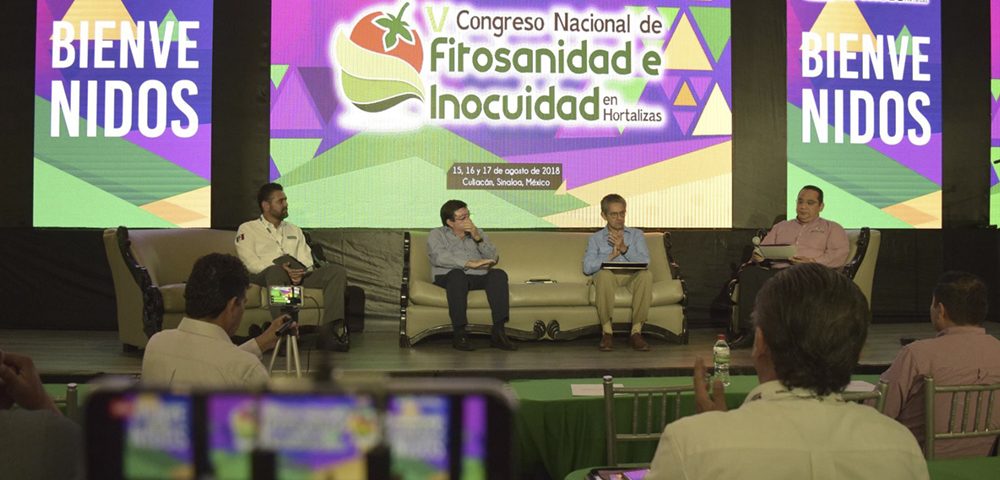Eleven Rivers participates in the panel: The Future of Horticulture in Mexico: Business Perspective

Within the framework of the V National Congress of Phytosanitation and Food Safety in Vegetables, the Panel entitled: The Future of Horticulture in Mexico: The Business Perspective was held. The panel was attended by the following guests: The M.C. Rosario Antonio Beltrán Ureta, General Director of Agrícola Belher, Dr. Ramón Paz Vega, Vice President of the Executive Council of the International Horticultural Alliance for the Promotion of Social Responsibility (AHIFORES) and Mr. Marco Antonio Díaz Vega, General Director of Grígoras The panel was moderated by the General Director of Eleven Rivers Growers, Mr. Raymundo Elizalde Gastelo.
The objective of the panel was to talk about the trends of Horticulture and Mexican Fruit Growing in terms of the current situation of the fruit and vegetable sector and the actions that are being undertaken to maintain and increase the competitiveness of our country in international markets.
Each of the participants answered 2 questions, then complemented with a general opinion of the perspectives of the sector of 5 minutes and at the end opened a space for questions and answers.
On behalf of Engineer Rosario Antonio Beltrán Ureta, the questions and answers were as follows:
Question: What are the main challenges we currently face in phytosanitary matters?
Answer: One of the great challenges we have is the dynamic in which the business has entered, with the commercial opening there is a tremendous mobilization of materials, of seeds.
Question: What recommendations could you provide to facilitate the implementation of a compliance culture in food safety in agricultural companies, considering that Agricola Belher is an example of what this represents in Sinaloa?
Answer: We were the first company certified by Eleven Rivers, for this to work, the first thing that must be discussed is the owner, since in this way the enthusiasm for doing things is transmitted.
On the part of Dr. Ramón Paz Vega, the questions and answers were as follows:
Question: What is the market trend in Social Responsibility and what role do buyers and consumers play in this issue?
Answer: The issue of Social Responsibility has gained importance in the world, especially since the 70’s, in the last century with a series of ecological-green movements that began mostly in Europe and at the same time a series of social movements, anti-discrimination, the vindication of women, pacifist movements as in the United States, all these large social movements were incorporated into companies.
In Mexico there is a tradition of Social Responsibility.
At the global level, two themes have taken special relevance: the conservation of the environment and the defense of human rights, which includes labor rights.
Specifically in the agricultural sector, the Social Responsibility is to produce food and one of the main issues about it, is the safety, the idea that we as food producers have to take care of the health of the consumer. This trend continues and new challenges come.
Question: What are the objectives of AHIFORES in the agricultural sector and what benefits can a producer obtain when achieving DEAR certification?
Answer: Born in 2015, it groups approximately 80% of the country’s fruit and vegetable producers.
Improve the level of welfare of workers involved in the production, marketing and packaging of fruits and vegetables, offer attractive employment options, be leaders in the agricultural area, be interlocutors with the Federal Government, substantially reduce their image risks, can demonstrate compliance with international labor standards.
On behalf of Mr. Marco Antonio Díaz Vega, the questions and answers were as follows:
Question: How can Sinaloan producers maintain and increase that leadership?
Answer: Definitely Sinaloa has been losing by the subject of new technologies, climate change, seed varieties as there is vegetable production throughout the country. Undoubtedly one of the main factors is the change of culture, you have to have that vision to change the way of thinking, to be more united as producers. Another important factor is the strategic alliances with the distributors and with the clients avoiding the greater number of intermediaries to reach them.
Another important point is innovation, turn to see the new trends. Our vegetables are healthy but you have to let people know. Also, social networks, the new way of informing is through them.
For example, Amazon already entered the food market, If we do not move, we die.
Answer: What should Mexican producers do to gain access to new, more distant and competitive markets?
Without a doubt, we can not stop seeing in the United States, since strategically it is convenient to do business with them, globalization is opening new doors, since there are many Mexican products that are being demanded a lot in other countries.


